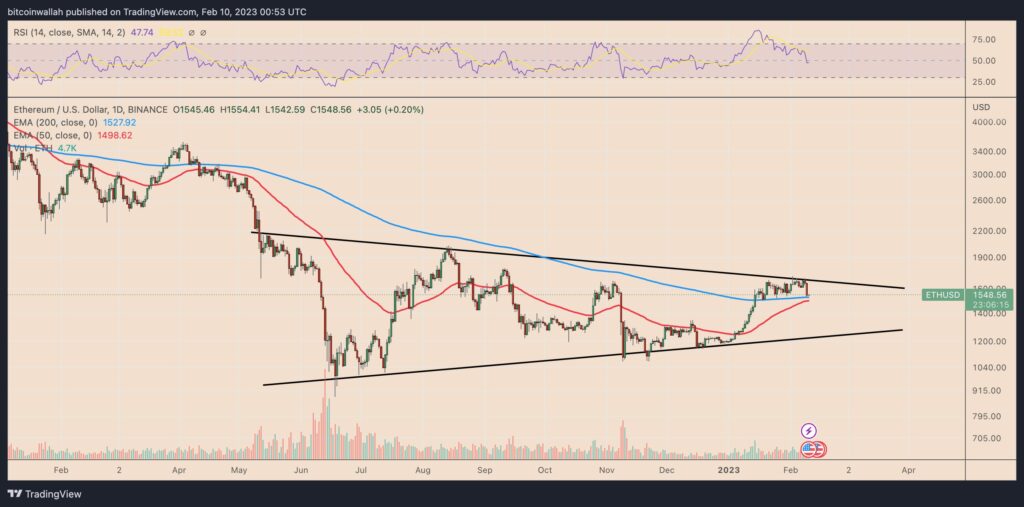The SEC’s focus on regulating cryptocurrency staking may impact both the price of ETH and its user activity. A potential drop in user activity could coincide with a decrease in ETH price.

Ethereum’s native cryptocurrency, Ether (ETH), experienced its worst daily performance of the year as it dropped to $1,483, estimated to be a 9% drop in its value. This came after the U.S. Securities and Exchange Commission (SEC) halted Kraken, a cryptocurrency exchange, from providing crypto staking services.
On the 9th day of February 2023, Kraken agreed to pay $30 million to settle with the SEC after being accused of violating securities regulations by providing crypto staking services to retail investors in the United States.
As expected, the news resulted in the decline of several proof-of-stake (PoS) blockchain project tokens. Ethereum, which transitioned to a staking-based protocol in September 2022, was also impacted by the news and experienced a decline in price such that on February 13, it plunged about 9% to $1483.
Ethereum is currently awaiting the release of its key network upgrade, dubbed Shanghai, set to launch in March. This much anticipated upgrade will enable Ether validators, who have locked in approximately $25.6 billion worth of ETH tokens in Ethereum’s PoS smart contract, to withdraw their assets along with their yield rewards.

Matt Hougan – CIO, Bitwise Assets Management
On the one hand, many analysts, including Matt Hougan, the Chief Investment Officer of Bitwise Asset Management, view Shanghai as a positive development for Ether. Consequently, they consider this network upgrade to be a bullish event for the altcoin.
“Today, many investors who would like to stake ETH and earn yield are sitting on the sidelines. After all, most investment strategies can’t tolerate an indefinite lock-up. So, most investors stay out of the market. But once that indefinite lock-up is removed, the percentage of investors willing to stake their ETH will explode.”
— Matt Hougan
CIO, Bitwise Assets Management
On the other hand, concerns have been raised regarding the future of crypto staking in the U.S., with Brian Armstrong, the CEO of Coinbase, expressing his apprehension that the SEC may prohibit retail investors from staking in the future. This has led to doubts about the viability of staking in the cryptocurrency market.

Brian Armstrong – Coinbase CEO
“We’re hearing rumors that the SEC would like to get rid of crypto staking in the U.S. for retail customers. I hope that’s not the case as I believe it would be a terrible path for the U.S. if that was allowed to happen.”
— Brian Armstrong (@brian_armstrong) February 8, 2023
In addition, some analysts contend that the prohibition of Ether-staking services would prompt users to shift away from Ethereum. This could potentially result in a significant loss of users for the network.
Ethereum’s PoS smart contract mandates stakers to deposit 32 ETH (equivalent to ~$50,000) to act as a validator. Thus, retail investors rely on third-party staking services that pool smaller amounts of ETH for validator status.
“If the SEC bans crypto staking for the public, then a majority of Ethereum validators will have to come down because you need 32 ETH to stake, which means the ETH network is going to experience issues.
— Ripple Van Winkle
Independent analyst
Technically, Ether’s price may experience a 20% price correction in February. ETH’s daily chart shows a pullback move after encountering its descending trendline as resistance and is currently holding its 200-day exponential moving average (200-day EMA; the blue wave) at around $1,525 as support.

ETH/USD daily price chart. Source: TradingView
It’s safe to say the negative market fundamentals of Ether increase the possibility of a drop below the 200-day EMA support wave, with a potential downside target of $1,200. This level corresponds to a multimonth ascending trendline support.
Please note that this article does not in any way, shape or form offer investment advice or recommendations. As with any investment and trading decision, readers must assume associated risks and do their own research before forging ahead to invest.










